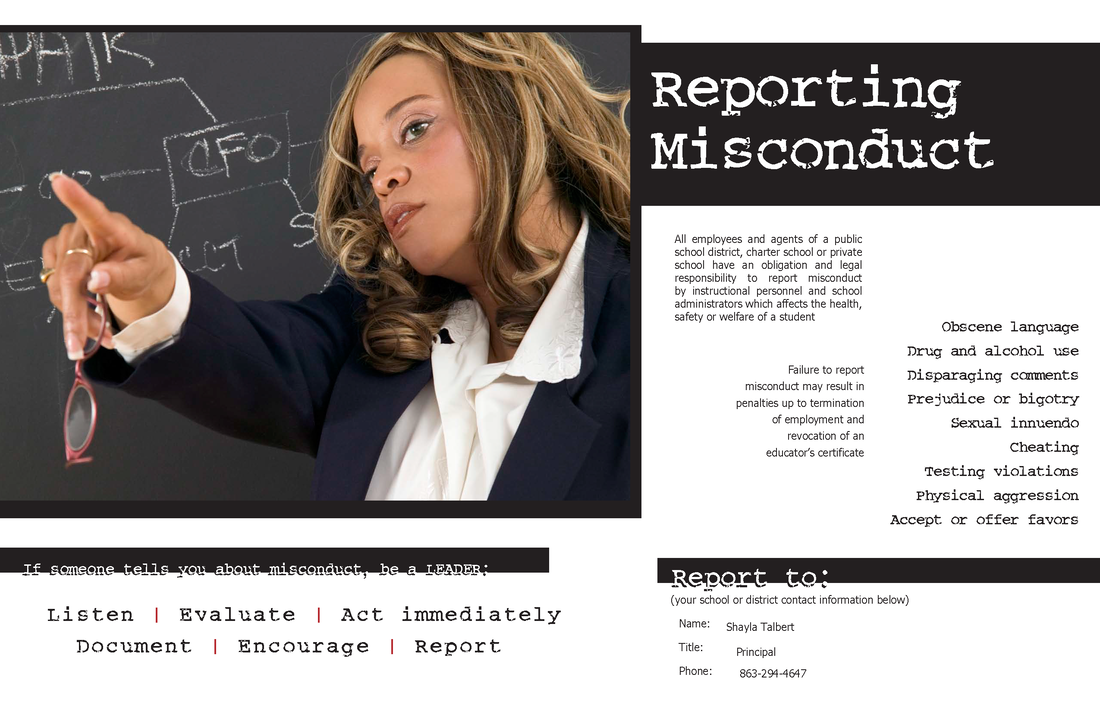| educator_misconduct_brochure.pdf | |
| File Size: | 1835 kb |
| File Type: | |
Child Abuse
Look for the signs
Dial 1-800-96-ABUSE
Signs of Physical Abuse
The child may have unexplained:
-bruises, welts, cuts, or other injuries
-broken bones
-burns
A child experiencing physical abuse may:
-seem withdrawn or depressed
-seem afraid to go home or may run away
-shy away from physical contact
-be aggressive
-wear inappropriate clothing to hide injuries
Signs of Sexual Abuse
The child may have:
-torn, stained or bloody underwear
-trouble walking or sitting
-pain or itching in genital area
-a sexually transmitted disease
A child experiencing sexual abuse may:
-have unusual knowledge of sex or act seductively
-fear a particular person
-seem withdrawn or depressed
-gain or lose weight suddenly
-shy away from physical contact
-run away from home
Signs of Neglect
The child may have:
-unattended medical needs
-little or no supervision at home
-poor hygiene
-appear underweight
A child experiencing neglect may:
-be frequently tired or hungry
-steal food
-appear overly needy for adult attention
Look for the Patterns
Serious abuse usually involves a combination of factors. While a single sign may not be significant, a pattern of physical or behavioral signs is a serious indicator and should be reported.
If a child tells YOU about abuse:
Be a good listener. Show that you understand and believe what the child tells you. Encourage, but don’t pressure him/her to talk. Ask open ended questions.
Be supportive. Tell the child he/she did the right thing by coming to you. Stress that he/she is not to blame. Let the child know that you want to help.
Don’t overreact. This can frighten the child or prevent him/her from telling you more. Do not talk negatively about the suspected abuser in front of the child.
Document and report it. Document your conversation as soon as you can. If possible, write down the child’s exact words.
Don’t delay. Never assume someone else will report the abuse. The sooner it’s reported, the sooner the child and their family can be helped.
WHO MUST REPORT ABUSE?
Doctors
Nurses
Social Workers
Police Officers
Child Care Workers
Any Witnesses
Any/All School Personnel
Call or Report it online at: http://www.dcf.state.fl.us/abuse/report/
Look for the signs
Dial 1-800-96-ABUSE
Signs of Physical Abuse
The child may have unexplained:
-bruises, welts, cuts, or other injuries
-broken bones
-burns
A child experiencing physical abuse may:
-seem withdrawn or depressed
-seem afraid to go home or may run away
-shy away from physical contact
-be aggressive
-wear inappropriate clothing to hide injuries
Signs of Sexual Abuse
The child may have:
-torn, stained or bloody underwear
-trouble walking or sitting
-pain or itching in genital area
-a sexually transmitted disease
A child experiencing sexual abuse may:
-have unusual knowledge of sex or act seductively
-fear a particular person
-seem withdrawn or depressed
-gain or lose weight suddenly
-shy away from physical contact
-run away from home
Signs of Neglect
The child may have:
-unattended medical needs
-little or no supervision at home
-poor hygiene
-appear underweight
A child experiencing neglect may:
-be frequently tired or hungry
-steal food
-appear overly needy for adult attention
Look for the Patterns
Serious abuse usually involves a combination of factors. While a single sign may not be significant, a pattern of physical or behavioral signs is a serious indicator and should be reported.
If a child tells YOU about abuse:
Be a good listener. Show that you understand and believe what the child tells you. Encourage, but don’t pressure him/her to talk. Ask open ended questions.
Be supportive. Tell the child he/she did the right thing by coming to you. Stress that he/she is not to blame. Let the child know that you want to help.
Don’t overreact. This can frighten the child or prevent him/her from telling you more. Do not talk negatively about the suspected abuser in front of the child.
Document and report it. Document your conversation as soon as you can. If possible, write down the child’s exact words.
Don’t delay. Never assume someone else will report the abuse. The sooner it’s reported, the sooner the child and their family can be helped.
WHO MUST REPORT ABUSE?
Doctors
Nurses
Social Workers
Police Officers
Child Care Workers
Any Witnesses
Any/All School Personnel
Call or Report it online at: http://www.dcf.state.fl.us/abuse/report/

